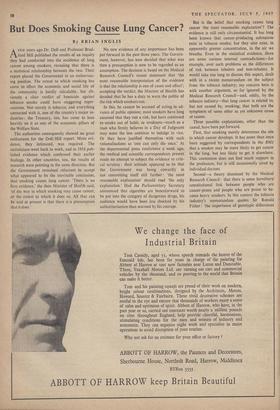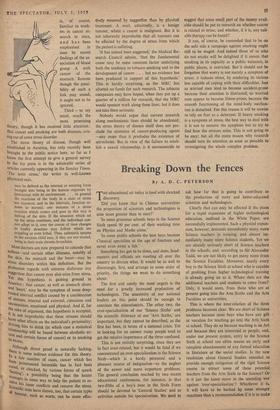But Does Smoking Cause Lung Cancer?
By BRIAN INGLIS
AFEW years ago Dr. Doll and Professor Brad- ford Hill published the results of an inquiry they had conducted into the incidence of lung cancer among smokers, revealing that there is a statistical relationship between the two. Their report placed the Government in an embarrass- ing position. The extent to which smoking has come to effect the economic and social life of the community is hardly calculable, but ob- viously a clear verdict of homicide against tobacco smoke could have staggering reper- cussions. Not merely is tobacco, and everything connected with it, one of the country's major in- dustries: the Treasury, too, has come to lean heavily on it as one of the economic pillars of the Welfare State.
The authorities consequently showed no great enthusiasm for the Doll/Hill report. More evi- dence, they intimated, was required. The statisticians went back to work, and in 1954 pub- lished evidence which confirmed their earlier findings. In other countries, too, the results of research were pointing in the same direction. But the Government remained reluctant to accept what appeared to be the inevitable conclusion, that smoking causes lung cancer. 'There is no firm evidence,' the then Minister of Health said, 'of the way in which smoking may cause cancer, or the extent to which it does so. All that can be said at present is that there is a presumption that it does.' No new evidence of any importance has been put forward in the past three years. The Govern- ment, however, has now decided that what was then a presumption is now to be regarded as an assumption. The decision is based on the Medical Research Council's recent statement that 'the most reasonable interpretation of the evidence is that the relationship is one of cause and effect'; accepting the verdict, the Minister of Health has decided that he has a duty to warn the public of the risk which smokers run.
In this, he cannot be accused of acting in ad- vance of public opinion; most smokers have long assumed that they run a risk, but have continued to smoke out of habit, or weakness—much as a man who firmly believes in a Day of Judgment may none the less continue to indulge in vice. Or they have justified themselves with such rationalisations as 'one can only die once.' At the departmental press conference a week ago, the medical and scientific correspondents present made no attempt to subject the evidence to criti- cal scrutiny : their attitude appeared to be that the Government was being cowardly in not committing itself still further : 'the most reasonable explanation' should read 'the only explanation.' Had the Parliamentary Secretary announced that cigarettes are henceforward to be put into the category of dangerous drugs, his audience would have been less shocked by his authoritarianism than warmed by his courage. But is the belief that smoking causes lung cancer 'the most reasonable explanation'? The evidence is still only circumstantial. It has long been known that cancer-producing substances exist in tobacco smoke; but they also exist, in apparently greater concentration, in the air we breathe. Even in the statistical evidence, there are some curious internal contradictions—for example, over such problems as the differences of risk between inhalers and non-inhalers. It would take too long to discuss this aspect, dealt with in a recent memorandum on the subject from the tobacco industry; my concern here is with another argument, so far ignored by the Medical Research Council—and, oddly, by the tobacco industry—that lung cancer is related to, but not caused by, smoking; that both are the symptoms of some other as yet unknown cause or causes.
Three possible explanations, other than the causal, have been put forward.
First, that smoking merely determines the site in which cancer develops. It has more than once been suggested by correspondents in the BMI that a smoker may be more likely to get cancer in the lung, but less likely to get it elsewhere. This contention does not find much support in the profession, but is still occasionally aired by individual doctors.
Second—a theory dismissed by the Medical Research Council : that there is some hereditary constitutional link between people who are cancer-prone and people who are prone to be- come heavy smokers. In this context the tobacco industry's memorandum quotes Sir Ronald Fisher : 'the importance of genotypic differences is, of. course, familiar to work- , ers in cancer re- search in mice, and has been emphasised in man by recent The stress theory of disease, though well established in America, has only recently been brought to the public notice here; so far as I know the first attempt to give a general survey in the lay press is in the admirable series of articles currently appearing in the Sunday Times. The term stress,' the writer (a well-known Physican) says,
may be defined as the internal or resisting force brought into being in the human organism by interaction with its environment . . . in general the reactions of the body in a state of stress are transient, and in the intervals, function re- turns to normal; one instance of a stress reaction which comes and goes in this way is itching of the skin. If the situation which set uP the stress continues, and the individual can- not adapt to it, over the course of time changes in bodily structure may follow which are crippling or even lethal. Thus, asthmatic spasms in the anxious child may, if they are not treated, bring in their train chronic bronchitis.
Most doctors are now prepared to concede that asthma—and certain other illnesses, notably of the skin, the stomach and the heart—may be stress disorders within this definition. But the profession regards with extreme disfavour any suggestion that cancer may also arise from stress. Yet this hypothesis is gaining ground in America : that cancer, as well as stomach ulcers and 'heart,' may be the symptom of some deep- rooted internal conflict caused by a combination of stresses, internal and external, conscious and ,u,neonscious, emotional and physical. And if, for the sake of argument, this hypothesis is accepted, t.t not improbable that these stresses should have other effects on the individual's personality; driving Ting him to drink (in which case a statistical relationship will be found between alcoholic ex- cess and certain forms of cancer) or to smoking In excess.
Although direct proof is naturally lacking, there is some indirect evidence for this theory. Ina fair number of cases, cancer which has been pronounced incurable has in fact been ccue,, or checked, by various forms of quack ; a possibility being that the healer manages in solv_ some way to help the patient to re- ivee .nIs inner conflicts and remove the stress. ntlfic tests have shown, too, that certain types of tumour, such as warts, can be more effec- tively removed by suggestion than by physical treatment. A wart, admittedly, is a benign tumour, where a cancer is malignant. But it is not inherently improbable that all tumours can be affected by the degree of stress from which the patient is suffering.
'it has indeed been suggested,' the Medical Re- search Council admits, 'that the fundamental cause may be some common factor underlying both the tendency to tobacco smoking and to the development of cancer . . . but no evidence has been produced in support of this hypothesis.' This is hardly surprising, as the M RC has allotted no funds for such research. The tobacco companies may have hoped,'when they put up a quarter of a million for research, that the MRC would sponsor work along these lines; but it does not take them seriously.
Nobody would argue that current research along mechanismic lines should be abandoned; the stress theory of disease itself does not pre- clude the existence of cancer-producing agents —any more than it precludes the existence of spirochetes. But in view of the failure to estab- lish a causal relationship, is it unreasonable to suggest that some small part of the money avail- able should be put to research on whether cancer is related to stress; and whether, if it is, any suit- able therapy can be found?
It can, of course, be contended that to be on the safe side a campaign against smoking ought still to be waged. And indeed those of us who do not smoke will be delighted if it means that smoking in its capacity as a public nuisance, in public places, is restricted. But it should not be forgotten that worry is not merely a symptom of stress; it induces stress, by rendering its victims less capable of coping with their difficulties. Just as worried men tend to become accident-prone because their attention is distracted, so worried men appear to become illness-prone, because the smooth functioning of the mind-body mechan- ism is disturbed. For this reason it will be unwise to rely on fear as a deterrent. If heavy smoking is a symptom of stress, the best way to deal with it is not to remove the symptom but to try to find how the stresses arise. This is not going to be easy; but all the more reason why research should turn its attention as soon as possible to investigating the whole complex problem.















































 Previous page
Previous page